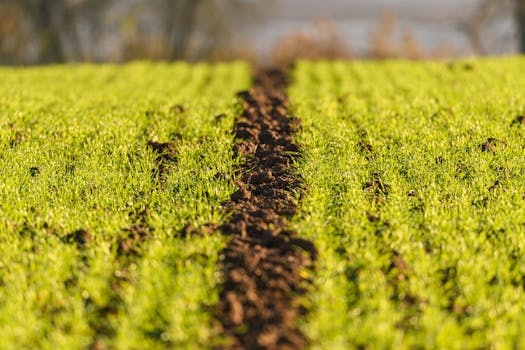
Introduction: The Importance of Soil Testing in Agriculture and Infrastructure Projects
In the world of agriculture and infrastructure projects, the adage “knowledge is power” takes on a literal meaning when it comes to soil testing. Knowing the exact properties of the soil you’re working with is not just an advantage – it’s a necessity. Soil testing illuminates the path towards optimal agricultural productivity and safe, efficient construction. It provides insights into the chemical content, toxicity, pH level, salinity, and other physical and chemical properties of the soil under scrutiny. These parameters are essential to select the appropriate crops in agriculture or decide on the land use for farming and infrastructure projects.
In the United Kingdom, the role of soil testing in infrastructure development is pivotal. With concerns about soil compaction and erosion prevalent, understanding the impact of different farming systems and practices on soil health becomes even more critical. Regular soil testing and monitoring are necessary to ensure the sustainability of agricultural lands and the safety and durability of infrastructure projects.
At the forefront of this field are companies like IBEX Consulting Engineers, offering comprehensive geotechnical and geo-environmental solutions, including innovative laboratory soil testing methods. These methods are designed not only to provide accurate and reliable results but also to be cost-effective, ensuring that project managers can optimize their resources without compromising on quality or safety.
In the following sections, we will delve deeper into the innovative laboratory soil testing methods and the process of laboratory soil analysis. We will also highlight the role of IBEX Consulting Engineers in soil testing and how they provide cost-effective and robust solutions for soil testing. So, let’s dig in and unearth the secrets of the soil.

The Role of Soil Testing in the UK’s Infrastructure Development
In the world of infrastructure development, the importance of soil cannot be overstated. It is the very foundation upon which all structures are built. Therefore, understanding its health and stability is paramount to a project’s success. So, let’s delve into the role of soil testing in the UK’s infrastructure development.
The Concerns about Soil Compaction and Erosion in the UK
In the UK, soil compaction and erosion are growing concerns that cannot be ignored. With four million hectares of land at risk of compaction and two million at risk of erosion, the need to focus on what’s happening both above and below the ground is increasingly critical. This has led to a greater emphasis on regular soil testing and monitoring for infrastructure projects.
Compacted soil can restrict plant root growth, reduce water infiltration rates, and decrease soil aeration. This can lead to poor plant health and reduced agricultural productivity. Similarly, soil erosion can remove the top nutrient-rich layer of the soil, making it less fertile and less capable of supporting plant growth.
The Impact of Different Farming Systems and Practices on Soil Health
Farming systems and agricultural practices have significant implications for soil health. As Dr Nathan Morris of NIAB TAG points out, the effects of different cultivation practices have been well-known for some time, but the focus is now shifting towards resilience and the role of soil biology. This involves understanding how to manage underground colonies of fungi and bacteria to our advantage.
For instance, no-till farming systems, which disturb the soil less than conventional tillage, have been found to improve soil health by increasing organic matter in topsoils, enhancing soil stability, and promoting earthworm activity. However, it’s important to note that no single farming system or practice will suit everyone or every situation. Hence, regular soil testing is key to understanding the specific needs and conditions of each land parcel.
The Importance of Regular Soil Testing and Monitoring for Infrastructure Projects
In the realm of infrastructure development, soil testing serves as an essential tool for risk management. It provides crucial data that can influence design decisions, help prevent construction delays, and ultimately minimise spiralling project costs.
By undertaking regular soil testing as part of their ground investigation surveys, companies like IBEX Consulting Engineers can provide robust, cost-effective solutions that meet local regulatory requirements. This includes geotechnical laboratory tests carried out in accordance with BS1377 to undertake soils and water tests, and geochemical laboratory tests for a fast and reliable turnaround of results.
In conclusion, soil testing plays a pivotal role in the UK’s infrastructure development. It helps to address concerns around soil compaction and erosion, understand the impact of different farming systems and practices on soil health, and underscores the importance of regular monitoring for infrastructure projects. With the help of innovative laboratory testing methods and companies like IBEX Consulting Engineers, we can ensure that the soil upon which we build our future is as healthy and stable as possible.

Innovative Laboratory Soil Testing Methods
A key part of soil testing is the measurement of soil moisture. Accurate moisture content measurement is vital in evaluating soil health and stability, which is crucial for both agricultural and infrastructure projects. Here, we delve into seven innovative laboratory soil testing methods that are commonly employed for soil moisture measurement.
The Oven-drying Method for Soil Moisture Measurement
One of the most commonly used methods, the oven-drying method, involves drying a soil sample in an oven at a specific temperature until all water content has evaporated. The sample’s weight is measured before and after drying to determine the moisture content. This method is particularly suitable for soils with a high organic matter content.
The Calcium Carbide Method for Soil Moisture Measurement
Offering immediate results, the calcium carbide method involves reacting a soil sample with calcium carbide. The reaction produces acetylene gas, the pressure of which is proportional to the soil’s moisture content. This method is prized for its speed and accuracy.
The Torsion Balance Method for Soil Moisture Measurement
The torsion balance method uses the principles of mechanics to measure soil moisture. The soil sample is placed on a balance, and the weight of the water in the sample is calculated by applying a calibrated torsion wire. This method provides precise measurements, but it’s more complex and time-consuming than other techniques.
The Pycnometer Method for Soil Moisture Measurement
The pycnometer method, also known as the specific gravity method, uses the principle of density to measure soil moisture. A pycnometer, a device that measures the volume of a soil sample, is filled with water and the soil sample, and the displaced water is measured to calculate the moisture content.
The Sand Bath Method for Soil Moisture Measurement
The sand bath method involves placing a soil sample in a container filled with sand and then heating it to evaporate the moisture. The weight of the water lost gives the moisture content. This method is less commonly used but can be effective for specific soil types.
The Radiation Method for Soil Moisture Measurement
The radiation method utilizes the principle of neutron scattering by hydrogen atoms, which are abundant in water, to measure soil moisture. By counting the number of scattered neutrons, the amount of water in a soil sample can be estimated. This method is complex and requires specialized equipment but provides highly accurate results.
The Alcohol Method for Soil Moisture Measurement
Finally, the alcohol method involves mixing a soil sample with alcohol, which binds to the water molecules in the soil. The mixture is then heated, causing the alcohol and water to evaporate. By measuring the weight of the evaporated liquid, the soil’s moisture content can be estimated. This method is less common but can be useful for specific soil types.
These innovative laboratory soil testing methods offer a range of options for measuring soil moisture, each with their unique advantages and limitations. The choice of method depends on the specific soil type, the resources available, and the precision required.

The Process of Laboratory Soil Analysis
Demystifying the complex world of soil testing may seem like a daunting task, but understanding the process can empower you to make better decisions for your projects. At the heart of laboratory soil analysis lies a methodical and systematic approach, ensuring the delivery of accurate and reliable results.
Sample Preparation: Identification, Drying, and Crushing
In any scientific endeavor, correct sample preparation is key to obtaining accurate results. In the realm of soil testing, this preparation involves assigning an identification number to each sample, transferring it to a paper bag, and placing it in a metal tray. Every 12th sample is a quality control sample, serving as a check for known chemical properties to ensure accuracy, or a duplicate sample to evaluate laboratory precision. The samples are then dried under forced air at a room temperature not exceeding 75°F. Once dried, the samples are crushed using a mechanical grinder and sieved through a stainless steel 10-mesh, or 2.0-millimeter sieve, to remove stones and unwanted debris.
Regular Soil Test: Analysis of Soil Texture, Organic Matter, pH, Lime Requirement, Extractable Phosphorus, and Available Potassium
The real magic happens in the core of the soil testing process. The regular soil test evaluates the soil texture, organic matter, pH level, lime requirement, extractable phosphorus, and available potassium. These parameters are fundamental in understanding the soil’s health and its suitability for various agricultural or construction purposes.
Additional Soil Tests: Analysis of Soluble Salts, Extractable Sulfur, Zinc, Copper, Iron, Manganese, Nitrate-Nitrogen, Exchangeable Magnesium and Calcium, Hot Water Extractable Boron, and Environmental Lead
While the regular test covers essential soil properties, the additional soil tests delve deeper into its composition. This includes analysing soluble salts, extractable sulfur, zinc, copper, iron, manganese, nitrate-nitrogen, exchangeable magnesium and calcium, hot water extractable boron, and environmental lead. These tests provide a more comprehensive understanding of the soil, offering valuable insights into its potential and limitations.
Florist/Greenhouse Tests: The Spurway Test and Saturated Media Extract (SME) Test
Specialized tests are also available for florists and greenhouse operators. The Spurway Test and the Saturated Media Extract (SME) Test are designed to assess the soil conditions in controlled environments, providing actionable information to improve plant health and growth.
Understanding the process of laboratory soil analysis is pivotal to make informed decisions about your soil management strategies. Whether you are a construction project manager, a farmer, or a backyard gardener, the insights gleaned from these tests can help you harness the full potential of your soil and achieve optimal results.
The Role of IBEX Consulting Engineers in Soil Testing
When it comes to soil testing, not all service providers are created equal. IBEX Consulting Engineers stand out in the crowd, providing innovative and comprehensive soil testing services that are tailored to the unique needs of each project.
Providing Cost-Effective and Robust Solutions for Soil Testing
Soil testing is a significant investment, but the value it brings is immeasurable. At IBEX, we understand the pressure to balance cost and quality. That’s why we’re committed to providing cost-effective yet robust soil testing services. We pride ourselves not only on the accuracy of our results but also on the efficiency of our processes. By minimizing unnecessary testing and focusing on the most critical aspects of soil health, we save our clients both time and money.
Ground Investigation Surveys and Soil Testing for Infrastructure Projects
At the heart of our services at IBEX is a broad range of ground investigation surveys and soil testing methods. We cater to the infrastructure industry across the United Kingdom, offering both intrusive and non-intrusive surveys as well as a variety of soil tests. Our tests cover a wide range of parameters including strength, density, plasticity, volume change potential, soil suction, compressibility, and permeability, making us a one-stop-shop for all your soil testing needs. Whether you’re working on a small-scale residential development or a large, complex scheme, our team of experienced chartered engineers is ready to provide top-quality solutions.
The Unique Selling Point of IBEX Consulting Engineers
What sets IBEX Consulting Engineers apart is our commitment to quality and our comprehensive approach to soil testing. We don’t just perform a series of tests; we provide a complete soil health assessment that includes initial Phase 1 Desk Studies, geotechnical assessment, soil sampling for infrastructure design, and cost-effective remediation solutions. We also collaborate with independent UKAS accredited laboratories, ensuring the accuracy and reliability of our results.
At IBEX, we understand that soil is more than just a medium for plant growth or a foundation for buildings. It’s a complex ecosystem that needs to be managed with care. Through our innovative laboratory soil testing methods, we help our clients understand their soil’s unique characteristics and provide them with the knowledge they need to make informed decisions. With IBEX, you’re not just investing in soil testing; you’re investing in the future of your projects.
Conclusion: The Future of Soil Testing and the Role of Innovative Laboratory Methods
As we turn the final page on the importance of soil testing in agriculture and infrastructure projects, the future of soil testing is crystal clear. It stands as a cornerstone in the contemporary world of agriculture and infrastructure development, playing a vital role in ensuring sustainable growth and development. The push for innovative laboratory soil testing methods, driven by high-tech advancements and a growing demand for precision in soil analysis, is set to revolutionize the field.
Emerging technologies are opening new horizons for soil analysis, with the potential to provide more precise and comprehensive data about soil health. These innovative methods, such as the oven-drying method for soil moisture measurement, the calcium carbide method, the torsion balance method, the pycnometer method, the sand bath method, the radiation method, and the alcohol method, are set to take centre stage in the future of soil testing. They will offer unprecedented insight into the soil’s characteristics and properties, enabling informed decision-making for both agricultural and infrastructure projects.
At the heart of this revolution is IBEX Consulting Engineers, leading the charge with our steadfast commitment to delivering robust and cost-effective solutions for soil testing. Our ground investigation surveys and soil testing methods are designed to provide a comprehensive understanding of soil properties, enabling optimal land use and project planning.
Our unique approach to soil testing goes beyond traditional methods, incorporating innovative laboratory procedures to ensure accuracy and precision. This commitment to innovation is what sets IBEX apart, offering our clients not just a service, but a partnership for the future.
As we move forward, the role of innovative laboratory soil testing methods becomes increasingly important. The ability to accurately measure and understand the intricate properties of soil will be paramount in addressing the challenges of sustainable agriculture and infrastructure development. With the guidance of expert companies like IBEX, the future of soil testing is not only promising but also an exciting journey towards improved sustainability and productivity.
In conclusion, the future of soil testing lies in our ability to leverage innovative laboratory methods to yield optimal results. With a clear understanding of the soil’s unique characteristics, both agricultural and infrastructure projects can thrive. It is this understanding that IBEX Consulting Engineers is proud to provide, helping to shape a sustainable future for all. Soil testing, at its core, is an investment in that future – a future that begins with the ground beneath our feet.